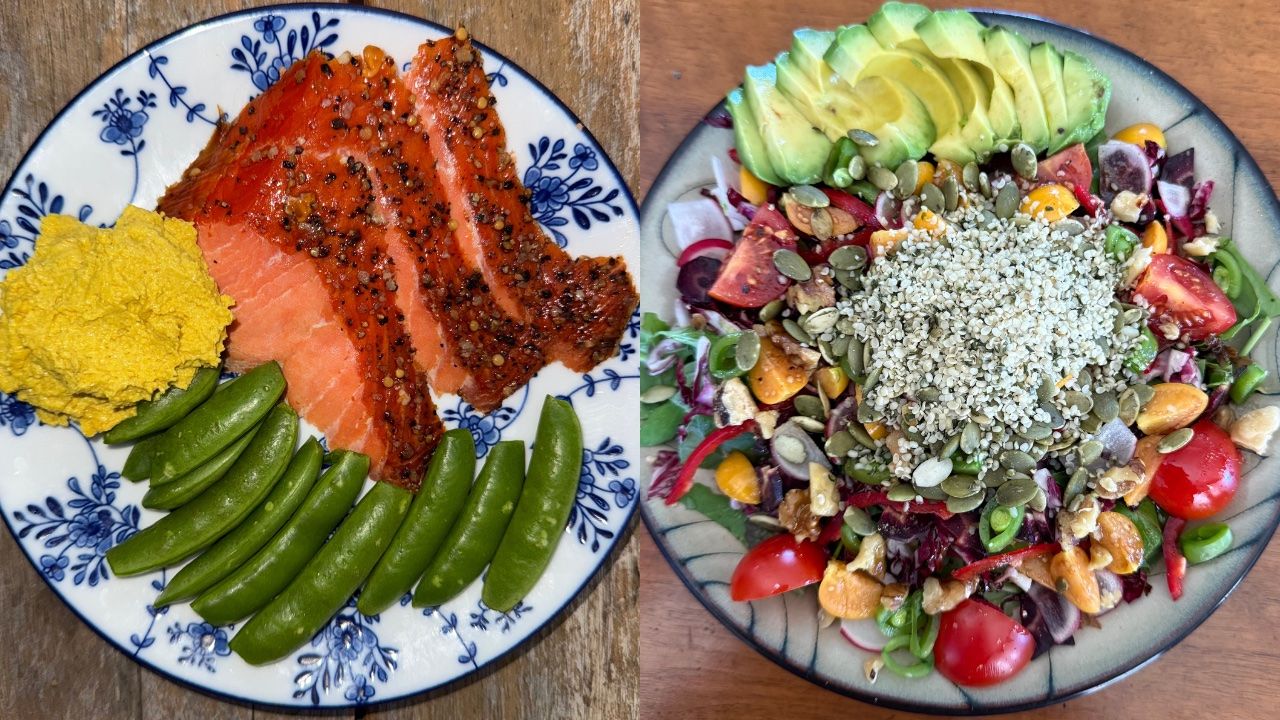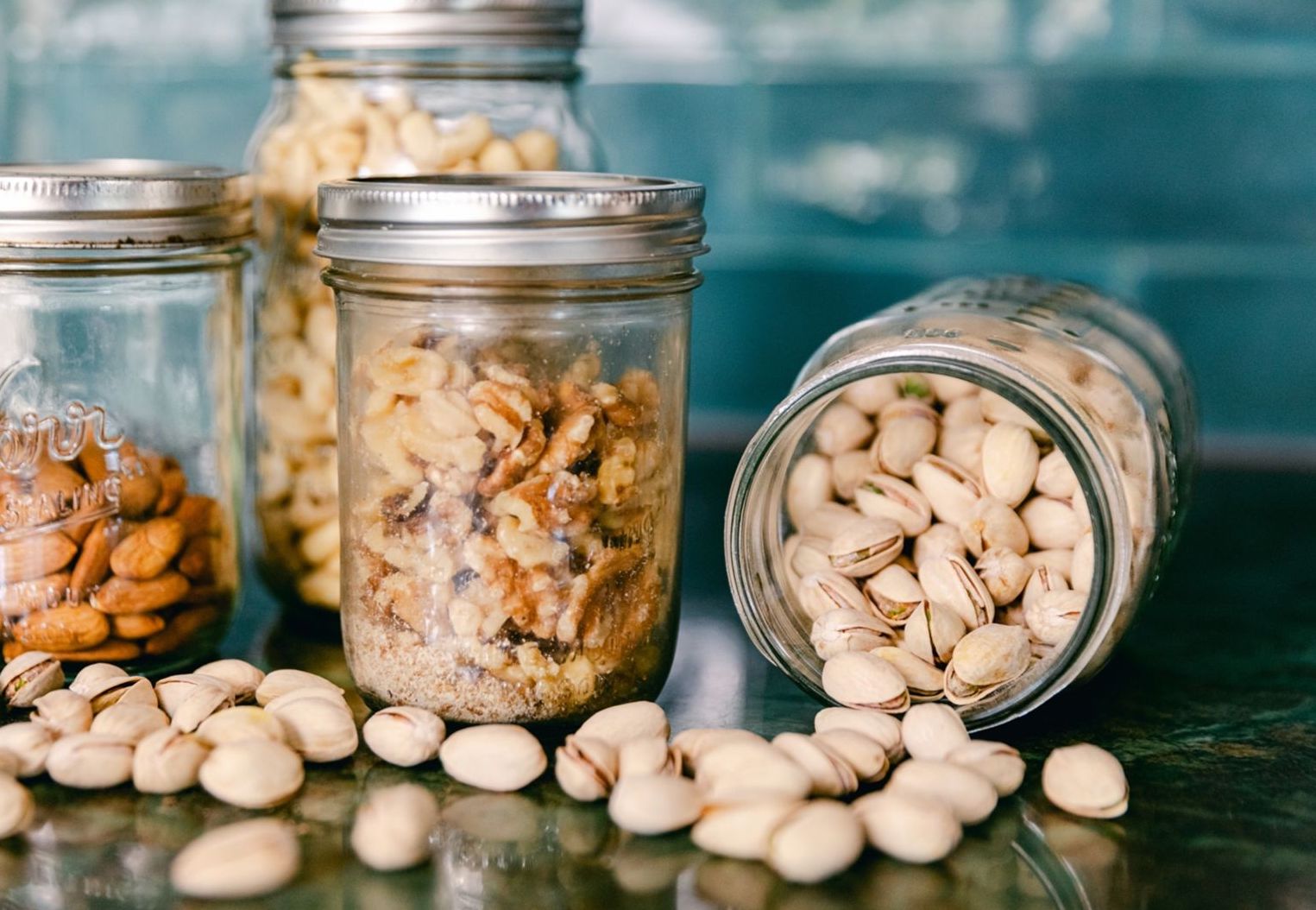Best Menopause Diet
Oct 21, 2025
Essential Nutrition Guide for Weight Loss and Hormone Balance
Menopause and perimenopause bring profound changes to a woman's body, and navigating this transition can feel overwhelming—especially when it comes to nutrition. We're bombarded with contradictory dietary advice, miracle supplements, and restrictive eating plans that promise to eliminate hot flashes, balance hormones, and restore vitality. The confusion around what to eat during this pivotal life stage often strips away the joy and simplicity that food should bring. But the truth is, supporting your body through menopause doesn't require complicated protocols or restrictive diets. It requires returning to the fundamentals: nourishing your body with the essential nutrients it needs to thrive. This guide will show you the best foods for menopause to support hormone balance, weight management, and overall vitality.
Breaking Free from Food Drama During Menopause
Why has there become so much drama around food? Food should be one of our greatest sources of pleasure, connection, and gratitude. Yet we find ourselves caught in a web of conflicting theories about how to eat and what to eat—theories that often unsettle us and rob us of joy during a time when we need comfort and clarity most.

The Simple Truth About Menopause Nutrition
The response to "what should I eat during menopause?" is beautifully simple: Focus on nutrient-dense, whole foods that you mostly prepare yourself. Eat with family and friends, or at least calmly and away from screens. As Michael Pollan wisely advises, "Eat foods that your grandmother would recognize."
Here's what's crucial to understand: food choices are as unique as each human being because we are bio-individuals. We also belong to many cultural and historical familial lines that inform our food choices and what feels comforting to us. Whether you're in perimenopause or menopause, the nutritional principles remain the same—though perimenopause nutrition may require extra attention to blood sugar balance and stress management as hormones begin their fluctuation.
Any dietary approach is potentially fine as long as it feels good in your body and you're getting adequate amounts of:
- Protein (essential amino acids)
- Healthy fats (omega-3 and omega-6 fatty acids)
- Minerals (calcium, magnesium, zinc, and more)
- Polyphenols (antioxidants from colorful plants)
These nutrients become even more critical during the menopausal transition.
Understanding Your Body's Nutritional Needs in Menopause
During menopause, it's easy to feel like your body is betraying you. But your body, infinitely wise, is still working tirelessly as a 3-D printer. The food you eat provides the ingredients to make the structures and systems that support your health and function, from gene expression to hormone signaling.

Common Menopause Symptoms That Nutrition Can Help Address
Menopause symptoms that proper nutrition can help manage include:
- Hot flashes and night sweats
- Weight gain (especially around the midsection)
- Mood swings and irritability
- Brain fog and memory issues
- Joint pain and inflammation
- Sleep disruptions
- Decreased bone density
- Low energy and fatigue
Why Nutrition Matters More During Hormonal Changes
This becomes especially important during menopause when your body is recalibrating its entire hormonal landscape. It's far too easy to underestimate the importance of this fact: Your body is built entirely from the food you eat. Every cell membrane, every hormone, every bone structure, every strand of collagen in your skin—all of it comes from your dietary choices.
Yes, we naturally have robust immune and detoxification systems, but during menopause, our bodies face additional stressors. Declining estrogen affects everything from bone density to cardiovascular health to brain function. Our bodies can only handle so much before they lose their balance, making the quality of our nutrition more important than ever.
Protein: The Foundation for Menopausal Health
What is essential to maintain balance during this transition? Breath, water, love… and the nine essential amino acids that our body cannot make on its own. They must come from food.
Why Protein is Critical During Menopause
Amino acids are the components of proteins, and proteins are the basic building blocks of our body: skin, bones, hair, nails, teeth, tendons, lungs, arteries, and more. During menopause, adequate protein becomes non-negotiable for several reasons:
- Maintains muscle mass (which naturally declines with age and hormonal changes)
- Supports bone density and prevents osteoporosis
- Stabilizes blood sugar and reduces cravings
- Provides raw materials for neurotransmitter production (crucial for mood and cognitive function)
- Supports healthy metabolism and weight management
Best Foods for Menopause: Complete Protein Sources
Without diving into the debate over what constitutes the "best" diet, let's focus on what matters: we need to eat a combination of foods that contain all nine essential amino acids.
Complete protein foods include:
- Buckwheat
- Chia seeds
- Dairy products
- Eggs (especially pasture-raised)
- Hemp seeds
- Poultry
- Quinoa
- Red meats (grass-fed preferred)
- Seafood
- Soybeans
- Spirulina
Complete protein combinations:
- Beans and rice
- Hummus and whole wheat pita bread
- Oats and peanut butter
How Much Protein Do You Need?
Keep in mind that the proportion of amino acids varies depending on the food. For instance, four ounces of chicken breast contains about 30 grams of protein, whereas you would need to eat almost four cups of quinoa to get the same amount. Combining quinoa with sprouted lentils brings you much closer with a comparable portion size.
Understanding bioavailability: This refers to how easily a protein is digested and absorbed. Animal proteins are considered "high quality" because their amino acid profile aligns with human requirements and they're easily broken down for assimilation. However, when plant proteins are soaked and sprouted, they become easier to digest and acquire greater nutritional value in the process. This is wonderful news for women who prefer plant-based eating during menopause.
Healthy Fats: Essential for Hormone Balance in Menopause
Whoever decided to demonize fat did women approaching and experiencing menopause a tremendous disservice. Fat is crucial to human health at every life stage, but particularly during this transition.

The Benefits of Healthy Fats During Menopause
Quality fats provide multiple benefits:
- Absorb fat-soluble vitamins (D, E, A, and K)—critical for bone health, immune function, and cellular protection
- Increase satiety and help manage blood sugar fluctuations
- Support hormone production and balance
- Build cell membranes and maintain cellular health
- Provide steady energy without blood sugar spikes
- Support brain health and cognitive function
- Reduce inflammation when you choose the right types
The Two Essential Fatty Acids
Omega-6 fatty acids are found in cold-pressed and unprocessed:
- Nuts
- Pumpkin seeds
- Sunflower seeds
- Peanut butter
- Avocado
- Tofu
They're inflammatory in nature, which in small proportions is useful to fight disease and heal from injury.
Omega-3 fatty acids are found in:
- Pasture-raised egg yolks
- Salmon (wild-caught preferred)
- Sardines
- Ground flax seeds
- Herring
- Grass-fed beef
- Mackerel
- Chia seeds
- Oysters
- Anchovies
- Marine algae
They're anti-inflammatory and promote cell membrane flexibility, which sends a powerful signal to your body: we are safe. During menopause, when inflammation can increase and contribute to various symptoms, omega-3s provide natural menopause relief by reducing hot flashes, supporting joint health, and improving mood.
Getting the Right Omega Balance
Like everything in life, the right proportions matter. The ratio between omega-6 and omega-3 should be between 1:1 and 4:1—that is, one to four parts omega-6 for every one part omega-3. This is where everything goes haywire for most people. The typical Western diet creates a ratio closer to 15:1, which is like igniting a forest fire from within.
Avoid Industrial Seed Oils
Why is the omega ratio so skewed? Because we rely too heavily on industrial seed oils such as canola, soybean, cottonseed, corn, and vegetable oils.
The industrial extraction process involves:
- Solvent-based extraction (often using hexane)
- High heat processing (causes oxidation and rancidity)
- Degumming
- Bleaching
- Deodorizing
- Adding colorants
The result? Pro-inflammatory oils that can drive disease and exacerbate menopausal symptoms like joint pain, hot flashes, and mood swings.
The Best Fats for Menopause
Natural fats are not only good but essential, especially during menopause. Choose these healthy fats:
- Extra virgin olive oil
- Avocado oil
- Coconut oil
- Pasture-raised butter
- Ghee (clarified butter)
Embrace them. Your brain, your hormones, your skin, and your cells will thank you.
The Complete Nutritional Checklist for Menopause

To nourish our bodies, avoid disease, and enjoy a long health span through menopause and beyond, we need to consume the essential nutrients that our body cannot make on its own:
- 9 essential amino acids (from protein-rich foods)
- 2 essential fatty acids (omega-3 and omega-6)
- 13 essential minerals (including calcium, magnesium, zinc, iron, selenium)
- 13 essential vitamins (A, C, D, E, K, and B-complex)
- Mineral-rich water for hydration and trace minerals
This isn't about perfection or restriction. It's about consistently providing your body with the building blocks it needs to adapt, heal, and thrive during this significant transition.
Creating Your Personal Menopause Nutrition Plan
Creating a menopause diet plan doesn't have to be complicated or joyless. The key is developing an eating approach that is as unique and beautiful as you are—one that honors your bio-individuality, your cultural heritage, and your body's changing needs.
Simple Steps to Better Nutrition During Menopause
- Focus on whole foods that are minimally processed
- Prepare meals with intention and avoid eating on the run
- Eat with loved ones when possible for connection and joy
- Listen to your body and honor what feels nourishing
- Prioritize protein at every meal (aim for 25-30 grams)
- Include healthy fats daily for hormone support
- Choose colorful vegetables for polyphenols and fiber
- Stay hydrated with mineral-rich water
- Avoid industrial seed oils and processed foods when possible
Above all, rekindle the joy and simplicity of eating good, nourishing food. Your body—your magnificent 3-D printer—deserves nothing less during this powerful transformation.
Menopause Diet for Weight Loss: A Personalized Approach
Weight management during menopause is one of the most common concerns women face, and for good reason—hormonal shifts directly impact metabolism, fat storage, and hunger signals. As a Metabolic Balance Coach, I help clients achieve their weight goals in harmony with their body's natural rhythms through real food and personalized nutrition.
Metabolic Balance uses precision blood work to reveal exactly which foods support your body's healing and metabolic reset. Unlike trendy weight loss programs, Metabolic Balance is 100% natural—no injections, pills, shakes, or packaged foods. No calorie counting, no "points." Just real food chosen specifically for your unique biochemistry.
When you give your body what it truly needs, your metabolism can reset naturally—bringing your hormones, digestion, and energy back into balance. This is the most sustainable and healthy way to achieve long-term weight loss during menopause and beyond.
In my 12-Week Nutritional Healing with Metabolic Balance program, I create a custom health protocol and personalized nutrition plan built entirely for you based on your blood chemistry, your metabolism, and your body's specific needs.
I will guide you back to metabolic health during perimenopause and the menopausal transition with nutritional healing and sustainable lifestyle strategies
Let's Connect
Get my email newsletter with health and wellness tips and information about how to work with me.

